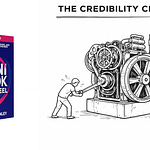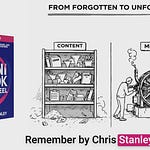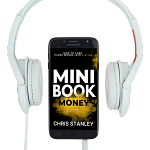🎙️ Episode 3: Why Books Still Win (Even in an AI World)
In a world full of video, TikTok, YouTube, and AI-generated everything…
Why would anyone still sit down to write a book?
Host Chris Stanley makes the case for why books, especially mini books, are still the most powerful medium for creators who want to turn words into wealth.
🧠 In this episode, you’ll learn:
Why writing has outlasted every medium in human history
How even AI depends on the written word
Why all great content, slides, speeches, podcasts, and products, start with writing
And why writing isn’t just about communication… it’s about clarity, culture, and creation
If you’ve ever wondered whether books are worth it in the age of AI and attention spans…
This episode will convince you that books aren’t dying, they’re evolving.
📚 Mini books are just the modern version of ancient wisdom, built to last, built to scale, built to sell.
TRANSCRIPTION
Welcome back, revenue Writers to The Revenue Writers Podcast, where we help you turn words into wealth of all kinds, not just money, but words into wealth. I'm gonna talk today about why I think books are still the best medium and media to create. Because there's a lot of different schools of thought out there.
You could, create your own software program. You could become a YouTube star, you could do TikTok, you could do this, you could do that. And there's all these different things. And why would I sit and write a book when I could do any of these other types of formats? Chris, that's the question, the vibe I get.
So explain why I think books are still a great way to win in the long run. And so number one. Writing has outlasted every other medium. Before we had microphones, before cameras or keyboards, we had chisels, and then when we graduated from chisels, we had ink and paper. I. And stories since the beginning of time were scratched into stone.
They were painted on walls, they were pressed into clay sometimes. And at the end of the day, writing isn't just information. It's a way to transfer culture. It is our culture. And so if we no longer right in a tangible physical sense there, there's no transfer of culture. And so because books have been around since the Bible and.
Jesus and all of that is books that have been passed down to us. It, I think that this written word, this thing called the written word's, gonna be around for a long time. So I, number one, that's number one. Number two some people would say why write a book? There's, everyone's into shorter content.
Everyone's, using AI to read books now, like why would I do that? There's been summaries, like cliff notes, video recaps, all sorts of things for decades. There's movies about the books that were written, right? One of the biggest movies of all time were just books in movie form.
And so I don't think that takes away from the legitimacy of books. If anything, I think it, it actually adds to it, and you'll see why here in a minute. So number three writing is how we think, speak, and create. So every format you're thinking about doing, whether it's a video, a podcast, a talk, a tweet it all starts with a blank page and you have to write it.
And you know the scripts are written. Lord of the Rings was a book first, right? Slides are written hooks. Are written to social media posts, to copywriters, they have to be able to write. And so before you publish anything, you usually have to what? Write it. So the written word is the mental processor that we use to catalog, store and communicate information.
So if you wanna think clearly, even just for yourself. Most of the time you have to write it. It's why journaling is so powerful. It's why writing books is so powerful because once you write it down in a format that is etched into stone in somebody's mind. It's a totally different thing for yourself.
You're dialing your thinking in. And then lastly, and most importantly, I think this really needs to sit on us as AI is really changing everything. Even AI needs writing to work. Okay, so let's pretend for a second. AI had been invented first. It would still need a writer, right? If you think about ai, you think about computers, all of this, it's all built on what ones and zeros, that's the written word.
Computers are ones and zeros. If we didn't know how to write, we could not create a computer. I. With ai, it's a large language model. A LLM. What does that mean? It means it's been trained and it's pulling from the written word that we've created. And so as AI continues to grow and as we continue to use it as a tool in our culture and our culture changes.
There needs to be that written component that is training it, that is communicating because it learns in a way very similar to the way that we learn. It's designed to learn similar to how we do. It's a artificial right, but it's still a version of how we learn. And so no matter what, if you're training ai, you're training your next employee, or you're trying to sell a course or build a business, communicating information, the way that humans have learned for thousands and thousands of years still comes back to that written word.
A mini book is just a more concise version of that. And if you look at the Bible, a lot of the books in the Bible are even short little letters or mini books. We've been using mini books for a long time and I don't think it's going anywhere. It might change the way it looks, smells, feels, but books are here to stay, so don't feel like they're going away.
And it's a bad investment 'cause it's good even if it's just for you. All right, until next time.












